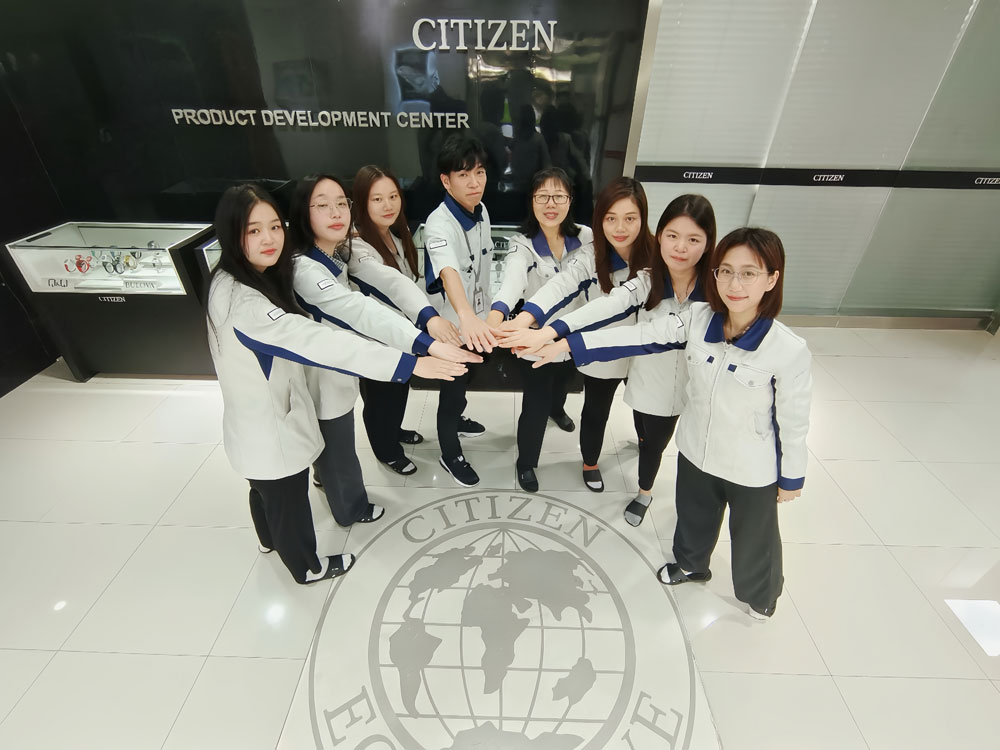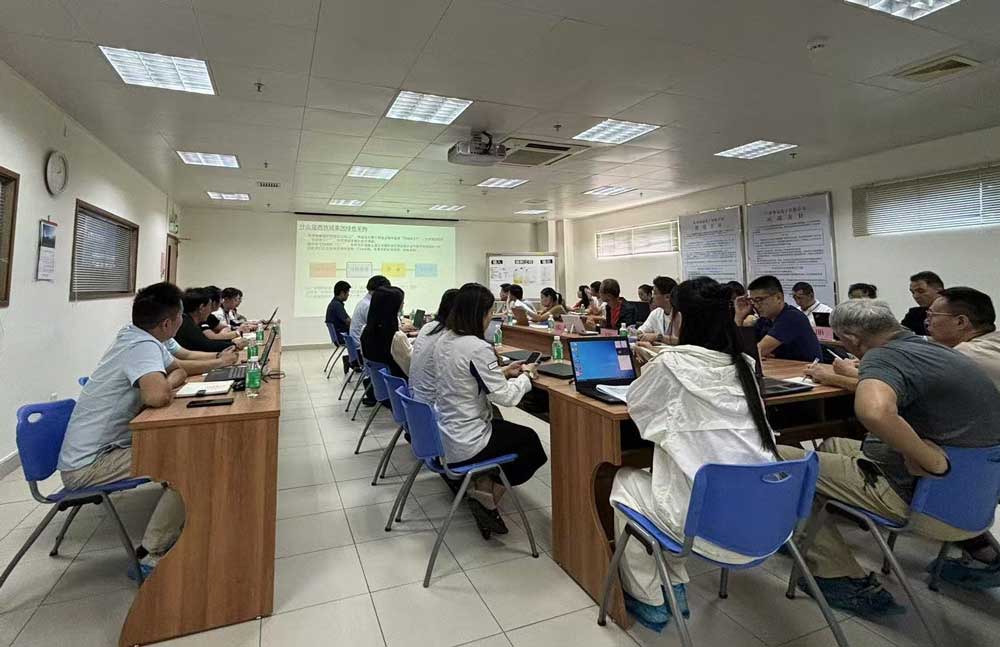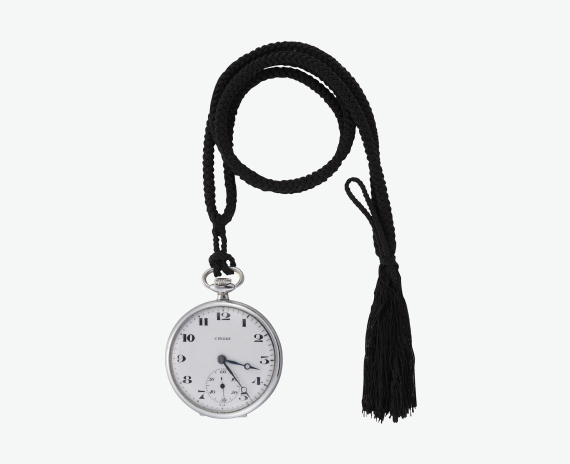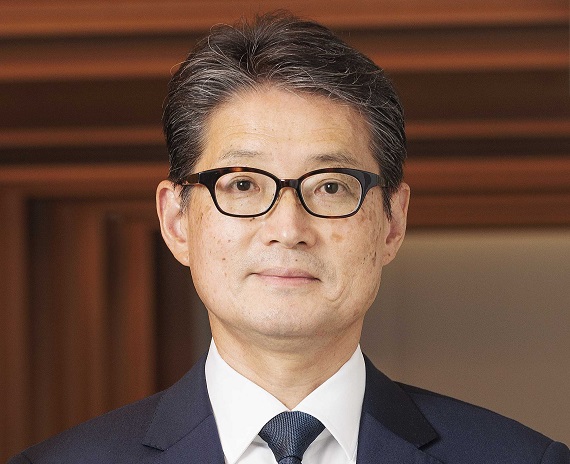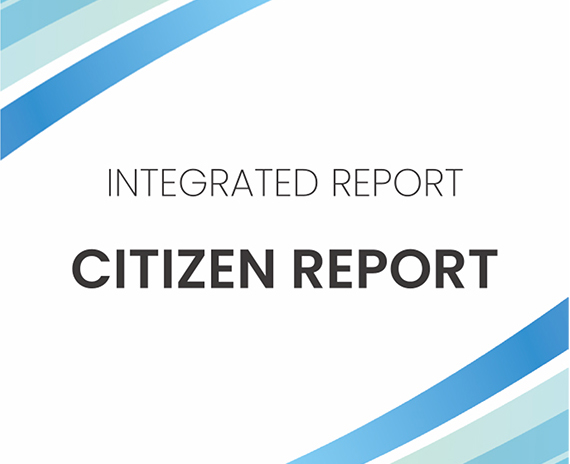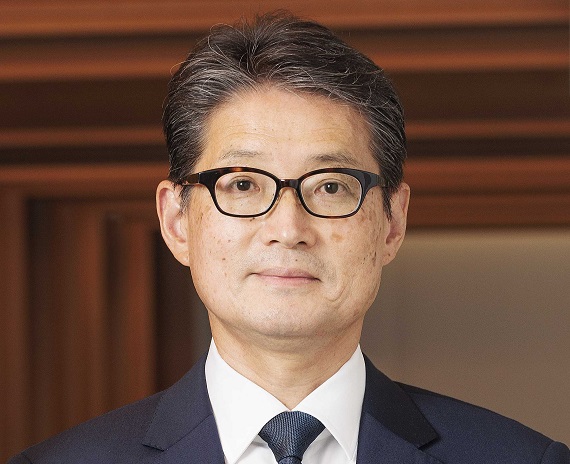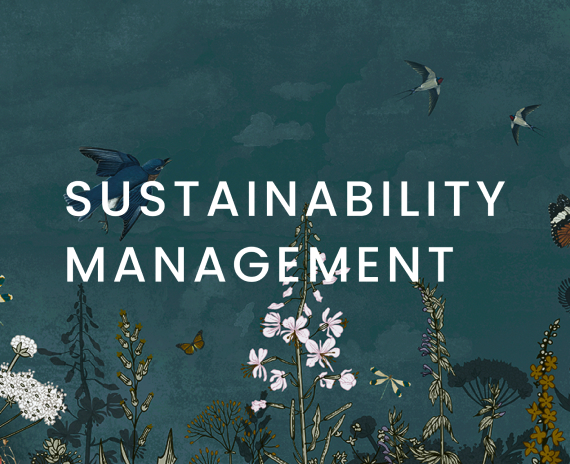-
Fair and transparent trading:
For the procurement of articles and services, besides quality, price, and delivery date, we select our partners based on ethical standards by measuring their compliance with laws and regulations as well as social norms. -
Compliance with laws, regulations, and social norms:
We will comply with the laws, regulations, and social norms of each country. -
Respect for human rights and consideration of the work environment:
We respect internationally declared human rights standards and promote procurement activities with consideration for the work environment. -
Promotion of green procurement with consideration for the environment:
To promote environmentally-friendly manufacturing, we adopt components with less environmental loads in a preferential manner, to contribute to the reduction of loads on the global environment. -
Existence and co-prosperity with partners:
We will build better partnerships with all our partners to achieve common goals, both domestically and overseas.
- TOP
- Sustainability
- Social: Promoting Sustainable Procurement
Promoting Sustainable Procurement
Basic Concept for Sustainable Procurement
The CITIZEN Group aims to contribute to a sustainable society through the realization of "sustainable factories" that take into consideration not only its own factories but also their manufacturing processes. A "sustainable factory" is a concept in which the entire value chain, including suppliers, is a sustainable factory. Collaboration with suppliers, who play a key role upstream in the value chain, is essential for the realization of a sustainable factory, and we practice sustainable procurement (CSR procurement, responsible minerals procurement, and green procurement) as well as production system development that comprehensively considers compliance, human rights, labor practices, BCP, and productivity improvement.
CSR Procurement
The CITIZEN Group has established The CITIZEN Group Basic Procurement Policy and is promoting CSR procurement in order to promote ESG throughout the supply chain. We ask our suppliers in Japan and overseas to comply with The CITIZEN Group CSR Procurement Guidelines, which outline requirements for respect for human rights, environmental conservation, occupational health and safety, and fair trade, based on the United Nations Global Compact and The CITIZEN Group Code of Conduct, to ensure that all our suppliers are well informed. The CITIZEN Group’s business is expanding both in Japan and overseas, and we are promoting employment mainly in the areas where our business sites are in to contribute to the local community. In addition, we promote appropriate local procurement of materials, parts, and equipment in accordance with the characteristics and environment of the items we produce.
The CITIZEN Group Procurement Policy (Established April 2017)
The CITIZEN Group CSR Procurement Guidelines
In April 2020, The CITIZEN Group revised The CITIZEN Group CSR Procurement Guidelines, now in its second edition. The guidelines present The CITIZEN Group's stance on the recent changes in social and economic conditions, international norms such as the United Nations Global Compact, and responses to requests from stakeholders. We are also seeking the endorsement of our business partners and are aiming to ensure that they are fully aware of the guidelines by linking their responses to the SAQ, which we ask them to complete. It also covers a wide range of elements, such as elements to solve social issues, including areas related to human rights and labor practices, to contribute to the achievement of the SDGs.
The CITIZEN Group’s CSR Procurement Guidelines (Established April 1, 2017. Amended April 1, 2020)
Introduction
The CITIZEN Group (CITIZEN WATCH Co., Ltd. and its group companies) aims to contribute to the wellbeing of the world’s population through "manufacturing activities that are well-loved by and friendly to citizens", by adhering to the corporate philosophy of being "Loved by citizens, working for citizens." With this corporate philosophy as its slogan, The CITIZEN Group intends to create strong partnerships with its business partners who give due consideration to social issues and actively promote CSR, based on the spirit of the United Nations Global Compact concerning human rights, labor issues, the environment and corruption prevention, and by strictly abiding by the "Code of Behavior Charter of The CITIZEN Group".
While we have been encouraging our business partners to be involved in CSR initiatives, we have revised our "The CITIZEN Group’s CSR Procurement Guidelines" in order to further develop the relationships of mutual trust with our business partners and to proceed with responsible procurement activities, towards the realization of a sustainable society.
We sincerely ask all our partners to understand and agree to the aims of the Guidelines and cooperate with us in promoting CSR procurement activities, including further propagation of the initiatives in their supply chains.
Corporate Governance
-
- Establishment of a CSR promotion system
-
We endeavor to conduct business activities to achieve a sustainable society while observing the law as a responsible company, abiding by social norms, meeting society’s expectations, and taking care not to have a negative impact on society and the environment. To this end, we have established a system for the management of ESG (environment, social, and governance) risks related to CSR and for implementing the PDCA (plan, do, check, and act) cycle.
-
- Healthy business activities
-
With a view to establishing an organizational structure for sound corporate management, we have established management systems and schemes within our company to ensure compliance with laws and regulations related to our business activities, the effectiveness and efficiency of our operations as a company, and the reliability of financial reporting and asset protection. We hereby also secure proper and effective business execution, transparency of management, and a multifaceted management monitoring system.
-
- Risk management
-
Toward the enhancement of our corporate governance and product quality compliance, we have secured and established schemes to verify the progress of our addressing risks and our response status against important risks as well as to respond to new risks, including ESG risks such as those related to compliance and the BCP (Business Continuity Plan), trade secrets, intellectual property, information security, labor practices, and environmental problems, in addition to financial risks.
-
- Establishment of a whistleblower system
-
For prevention, early detection, and improvement in the self-cleaning functions of compliance-related problems in our company’s business activities, such as legal violations or wrongful acts or acts that could be a compliance problem, or for our employees who themselves have suffered human rights or labor abuses, we have secured a system for our employees to directly report to or consult with a dedicated department or outside contact, even anonymously. We have also secured a system to ensure confidentiality and to make sure that the whistleblower or the persons who have consulted will not be treated unfavorably.
-
- Disclosure of information
-
We place importance on the relationships with society and stakeholders in our business activities, and we promptly and accurately disclose financial information and nonfinancial information in response to requests for transparency and accountability.
Human Rights
-
- Respect for human rights and the prohibition of discrimination
-
We support and respect the protection of internationally declared human rights*, and strongly denounce any kind of discrimination (including but not limited to any discrimination based on gender, sexual orientation, sexual expression, age, existence of a disability, nationality, race, skin color, religion, and marital history).
- * The Universal Declaration of Human Rights, International Labor Organization’s Declaration on Fundamental Principles and Rights at Work, Ten Principles of the UN Global Compact, UN Guiding Principles on Business and Human Rights, OECD Guidelines for Multinational Enterprises, and UK Modern Slavery Act, etc.
-
- Avoidance of complicity in human rights abuses
-
We take due care so that none of our business activities, products or services will ever cause human rights abuses or lead to complicity in human rights abuses. Should it become clear, however, that we have happened to be involved in any of such issues, we will promptly make corrections and remedy the situation by undertaking appropriate procedures.
-
- Prohibition of inhumane treatment
-
We respect the human rights of our employees and prohibit any kind of inhumane treatment such as abuse, physical punishment, and harassment.
Labor
-
- Corruption prevention
-
Maintain sound relationships, including the proper management of hospitality, with government agencies and public officials in the countries and regions where we conduct business activities.
-
- Prevention of the giving and receiving of improper advantages
-
We maintain healthy relationships with our customers and trade partners, etc. in sales and purchasing activities, etc., by preventing the giving and receiving of improper advantages among ourselves.
-
- Basic attitude toward labor practices
-
We prevent unfair business practices such as bid-rigging, cartels, abuse of dominant bargaining positions, and other unfair trading practices from occurring.
-
- Provision of equal opportunities
-
We recognize that the labor principles presented in international norms* are universal values and adopt them as our basic workplace principles.
- * The Universal Declaration of Human Rights, International Labor Organization’s Declaration on Fundamental Principles and Rights at Work, Ten Principles of the UN Global Compact, UN Guiding Principles on Business and Human Rights, OECD Guidelines for Multinational Enterprises, UK Modern Slavery Act, etc.
-
- Payment of fair wages
-
We abide by the legal minimum wage of the countries and regions where our business activities are conducted and will not reduce wages unreasonably. We abide by the laws and regulations of the countries and regions where our business activities are conducted regarding overtime work, payroll deduction, piecework wage, other benefits, etc. At the time of paying wages, we deliver pay slips that can confirm the accurate rewards corresponding to the work performed, at the appropriate time.
-
- Fair application of working hours, time off, paid time, etc.
-
We abide by the working hours agreed upon with the employees in advance and ensure that employees’ working hours are managed appropriately so that they do not exceed the statutory limit in the countries and regions where our business activities are conducted, and we also seek to prevent excessive overtime work. All our employees are given the right to take paid time off and also given at least one day off per week.
-
- Prohibition of forced labor
-
We avoid making people work against their will and making people do work that restricts their freedom to leave their jobs. We ensure that work coercion using unjustified means of restraint, compulsory overtime work and bonded labor, slave labor, prison labor, etc. are not practiced and that the unjustified retention of identification documents and the unjustified collection of deposits are not practiced.
-
- Prohibition of child labor
-
We avoid employing children under the legal working age in the country and region where our business activities are conducted. We ensure that children are not made to perform night work, dangerous work, etc. that could harm their health, development, safety, or morals.
-
- Recognition of the freedom of association and the right to collective bargaining
-
We respect the basic labor rights of our employees, such as their freedom of association, freedom to join a labor union, and their right to collective bargaining.
-
- Proper management of employees’ health and safety
-
We secure the safety of the work environment and perform inspections and proper maintenance of our facilities thoroughly so as to prevent unforeseen accidents and disasters. We understand the risks of harmful chemical substances, noise, odors, etc. on the human body, and ensure sanitary, safe, and healthy work environments. We promote the creation of a workplace that is considerate of employees’ mental and physical health.
The Environment
-
- Basic attitude toward environmental initiatives
-
We should be aware of environmental issues in business processes and establish systems to resolve them. We also identify factors that have an impact on the environment and properly manage them.
-
- Management of chemical substances
-
We manage chemical substances indicated in the laws and regulations of the countries and regions where our business activities are conducted and ascertain and report the amount of handled chemical substances to the government properly.
-
- Reduction of the environmental burden
-
We endeavor to prevent the occurrence of pollution, monitor and control wastewater, sludge, and air emissions, etc., and reduce outflow. We also set our independent reduction targets for the reduction of the environmental burden at the level prescribed by law in the countries or regions where our business activities are conducted or set even more rigorous voluntary environmental impact reduction targets and make further improvements thereof.
-
- Sustainable and efficient utilization of resources (energy, water, raw materials, etc.)
-
We set our independent reduction targets for implementing resource conservation and energy savings, and make efforts to use resources and energies effectively and continuously.
-
- Reduction of GHG (greenhouse gas) emissions
-
As a means to combat climate change, we set our independent reduction targets for greenhouse gases such as CO2, methane, and fluorocarbons, and endeavor to reduce them continuously.
-
- Reduction of waste
-
We set our independent reduction targets for waste, and endeavor to conduct the responsible disposal or recycling of waste.
-
- Protection of biodiversity
-
We conduct investigations into the direct and indirect impacts of our business on the ecosystem, and endeavor to protect biodiversity and ensure the sustainable utilization of the environment.
Fair Business Practices
-
- Corruption prevention
-
We maintain healthy relationships with national/local governments and public officials in the countries and regions where our business activities are conducted by establishing appropriate relationships with them.
-
- Prevention of the giving and receiving of improper advantages
-
We maintain healthy relationships with our customers and trade partners, etc. in sales and purchasing activities, etc., by preventing the giving and receiving of improper advantages among ourselves.
-
- Prevention of competition law violations
-
We prevent unfair business practices, such as bid-rigging, cartels, abuse of dominant bargaining position, and other unfair trading practices, from occurring.
-
- Rejection of relationships with antisocial forces
-
We prohibit our employees from contacting and giving any benefits to antisocial forces.
-
- Respect for a third party’s intellectual property
-
We respect intellectual property rights, including patent rights, copyrights, and trademark rights, and do not infringe on others’ intellectual property rights.
-
- Prohibition of insider trading
-
We prohibit persons involved with a listed company, etc. from using undisclosed company information to trade that company’s stocks, etc.
-
- Prohibition of acts with conflicting interests
-
We prohibit our employees from enjoying personal benefits at the expense of the company’s benefits. Any act that may be interpreted as such must be avoided and appropriate trading must be pursued.
-
- Services for responding to complaints from outside the company and for consultations
-
Our trade partners or customers who have knowledge of important risk information can directly report or consult with a dedicated outside contact department of our company. We have established a system to ensure confidentiality and to ensure that the informant will not be treated unfavorably.
-
- Establishment of a BCP (Business Continuity Plan) system
-
We have established a system wherein in the event of an emergency such as a natural disaster, quick restoration is realized while important duties and businesses can continue.
-
- Management of confidential information and protection of private information
-
We perform proper management to ensure that none of the confidential information of our customers, business partners, our own company, etc. is ever leaked. We also properly manage and protect the private information of our customers, trade partners, employees, etc.
Quality and Safety
-
- Ensuring product and service quality and safety
-
We provide products and services that meet the necessary quality and safety standards as stipulated in the laws and regulations of the countries and regions where our business activities are conducted.
-
- Appropriate response to product and service accidents
-
In order to prepare for situations where any accident relating to our product or service has occurred or where any defective goods of our company have been circulated, we have established a system through which we disclose information promptly, notify the relevant authorities of the situation, recall the product in question, take safety measures for our supply destinations, and strive to prevent a recurrence.
-
- Response to our customers’ need
-
We provide environmentally friendly and socially beneficial goods and services that pursue quality and costs acceptable to our customers by correctly grasping the social needs.
Information Security
-
- Basic attitude toward information security
-
We properly manage and protect information obtained through our business activities and take defensive measures against threats to our computer networks.
-
- Defense against attacks on computer networks
-
We take defensive measures against attacks on our computer networks and ensure the effective management of threats to avoid damage to our company and any other companies.
Supply Chain
-
- Basic attitude toward the supply chain
-
In order to fulfill social responsibility regarding not only our company but also the whole supply chain, we endeavor to make the importance of a sustainable procurement policy widely known among our trade partners.
-
- Responsible procurement of minerals
-
We make it our company’s policy not to purchase or use raw materials containing tantalum (Ta), tin (Sn), tungsten (W) or gold (Au), which are conflict minerals linked to inhumane acts committed by local armed groups in the Democratic Republic of the Congo and its surrounding regions.
Harmonious Coexistence with Local Communities
-
- Contribution to local communities
-
We respect the culture and customs in the countries and regions where our business activities are conducted and carry out initiatives that can contribute to the sustainable development of local communities.
Sustainable Procurement Promotion System
As a framework for promoting sustainable procurement, the Group Sustainable Procurement Committee has been established under the Sustainability Committee, with the Product Management Department and the Sustainability Promotion Department of CITIZEN WATCH as the secretariat. This committee has been established by reviewing the existing promotion system in conjunction with the renewal of the Procurement Guidelines. It is chaired by the director in charge of sustainability at CITIZEN WATCH, with the procurement departments, CSR departments, and environmental management departments of Group companies participating as committee members. The committee meets twice a year to strengthen inter-group cooperation through partnerships with suppliers and to confirm the procurement status in order to realize sustainable procurement for the entire group, leading to a better understanding of the actual status of suppliers and the prompt implementation of requests for correction and other measures.
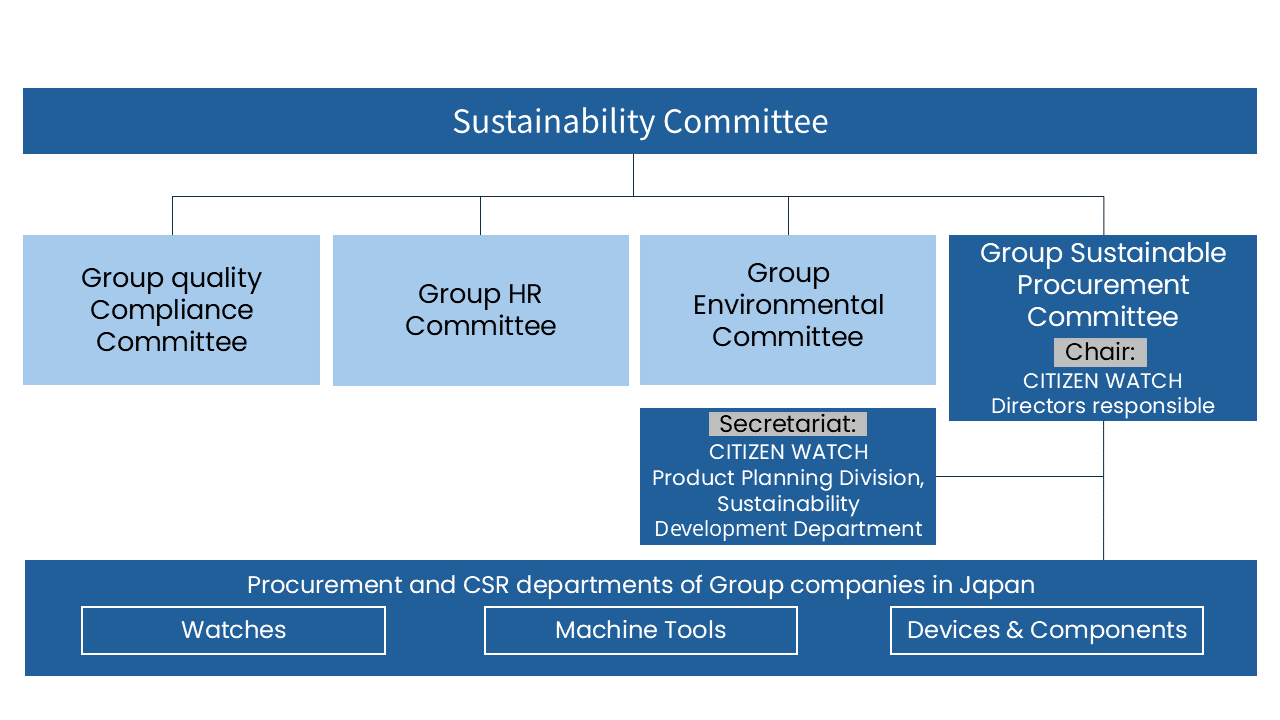
Progress against the Roadmap
In adherence to The CITIZEN Group CSR Procurement Guidelines, The CITIZEN Group has charted a roadmap extending to 2030. This trajectory aims at achieving "100% adherence to the CSR Procurement Guidelines by 100% of The CITIZEN Group and 70% of its pivotal suppliers." Since FY2022, we have strengthened our digitalization of survey documents. In FY2025, we will continue to enhance our efforts to identify supplier risks through SAQ and the development of analytical tools and strengthen activities such as fact-finding and corrective measures.
Please scroll down to see→
| FY2025 | FY2026 | FY2027 | FY2030 | |
|---|---|---|---|---|
| Goal |
|
|
|
|
| KPI |
|
|
|
|
| Measures |
|
|
|
|
Sustainable Procurement Initiatives
Supplier briefing sessions
To seek cooperation in sustainable procurement, we hold an annual briefing session on procurement for domestic and overseas suppliers. (Briefing materials are available in Japanese, English, and Chinese.) For the 2024 briefing, an explanatory video was distributed to all major suppliers. The explanatory materials explain The CITIZEN Group’s efforts to achieve the SDGs and the company’s thoughts.
Survey
We send our suppliers "Requests to Our Business Partners," summarizing our human rights and environmental policies as well as our CSR Procurement Guidelines, and ask for their understanding and compliance with The CITIZEN Group’s ideas and policies. In addition, since FY2022, we have introduced digitalization into our survey to improve survey efficiency and strengthen risk identification. Since FY2024, we have conducted surveys of all major suppliers.
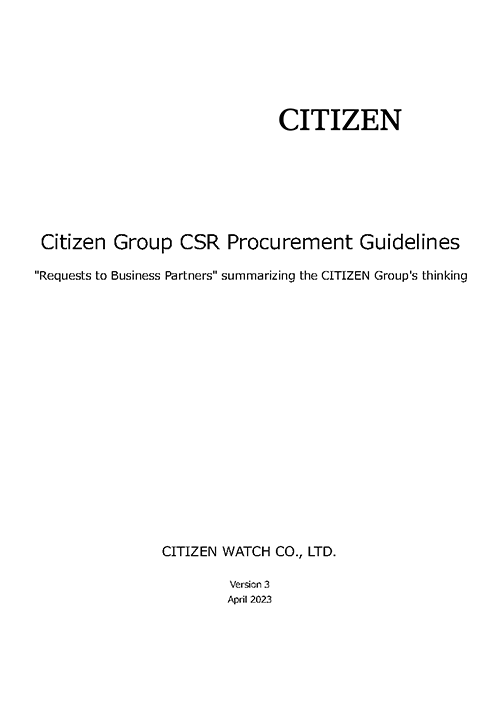
Requests to Our Business Partners
Selection of Key Suppliers
In addition to having them sign a basic transaction agreement that takes ESG aspects into account besides QCD (quality, cost, delivery), we conduct SAQ for all key suppliers, positioning "key suppliers" as suppliers in the top 90% in terms of the procurement volume of direct materials related to products and suppliers who handle important items that cannot be substituted. Moreover, key suppliers undergo annual updates. Regarding sustainable materials, one of the contributing factors of CITIZEN WATCH’s sustainable products, we ask all suppliers to respond to SAQ when selecting key suppliers.
Survey Using the Supplier Questionnaire (SAQ)
Understanding risks through SAQ
As part of its efforts to understand CSR procurement risks, The CITIZEN Group conducts surveys of domestic suppliers using SAQ. The SAQ is based on the common SAQ developed by Global Compact Network Japan (GCNJ). It consists of 114 questions about basic CSR issues, including human rights, the environment, and fair business practices.
Risk analysis
We have established a system to set a risk rank for suppliers based on the comprehensive score rate derived from the SAQ radar chart analysis and to collect SAQ responses online, thereby identifying suppliers with heightened procurement risks, as demonstrated by the survey results and responses.
Recognizing that supplier risk assessment can fluctuate in response to external circumstances, we are committed to refining our risk assessment processes. This includes conducting supplementary surveys using the "Supplier Fact-Finding Survey* Check Sheet," created independently by the Group for high-risk suppliers, thereby ensuring more accurate risk assessments and fostering improvement endeavors. The survey focuses on human rights, labor, and the environment.
- * The CITIZEN Group's term for on-site supplier audits and monitoring
Risk Rank Setting for SAQ
Please scroll down to see→
| Risk rank | Scoring rate (%) | Description |
|---|---|---|
| Low risk | 80% or more | Basically, actions are being taken at the level required by The CITIZEN Group CSR Procurement Guidelines. Items requiring improvement can also be voluntarily improved. |
| Middle risk | 50–79% | There are some items for which action is not taken at the level required by The CITIZEN Group CSR Procurement Guidelines, but voluntary improvements can be made. |
| High risk | 49% or less | Status monitoring is required based on improvement plans for items for which action is not taken at the required level in The CITIZEN Group CSR Procurement Guidelines. |
Suppliers Audits
In fiscal year 2024, from among the suppliers to whom we sent the SAQ, we conducted audits on 17 companies across the CITIZEN Group, focusing on human rights, environmental, and ethical risks.During the audits, in addition to a preliminary document-based review, we systematically checked items related to the CSR Procurement Guidelines using a checklist through on‑site inspections, document reviews, and interviews.As a result of the audits, no significant risks—including compliance violations—were identified.Furthermore, based on the audit results, we held training sessions on environmental issues and promoted the sharing of best practices among suppliers.
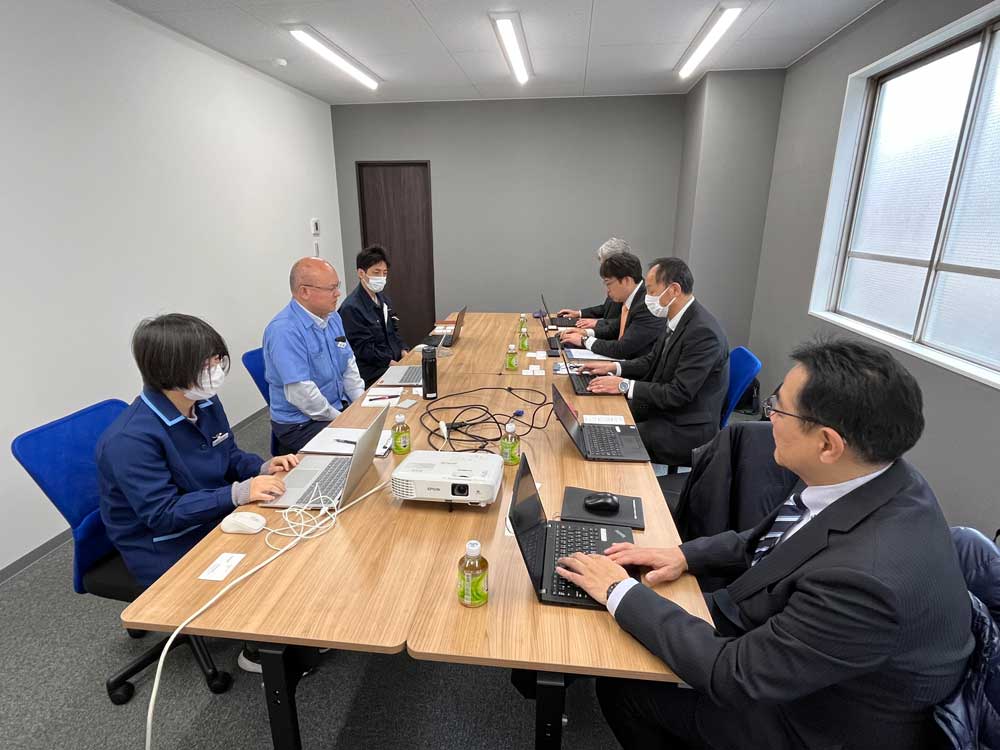
SAQ Survey for New Suppliers
When entering into new transactions with suppliers, we select them in accordance with our
purchasing regulations. After signing a basic contract with each supplier that includes clauses related
to ESG (E: Environmental, S: Social, G: Governance), we ask the supplier to respond to the SAQ (issued
by Global Compact Network Japan; consisting of 114 questions on CSR, including the environment, human
rights, labor, and corruption), which we ask existing suppliers to complete annually.
For suppliers
who provide raw materials that qualify as sustainable materials for CITIZEN WATCH, we conduct an advance
site visit depending on the status of their SAQ responses.
In conjunction with the SAQ, a set of
materials including The CITIZEN Group Anti-Corruption Policy is distributed.
Group Training and Study Sessions
The Group Sustainable Procurement Committee, which oversees procurement for the entire Group, has been holding an annual "Expert Study Session" since FY2020 for employees in departments involved in procurement operations to improve procurement risks and resolve issues.
In FY2024, we invited an external lecturer to hold a study session on corrective actions in a
responsible minerals procurement survey. We also hold study sessions on sustainable procurement as part
of our sustainability seminars, which are held twice a year, for all Group employees, not just those in
the procurement departments.
All employees also attended a seminar on the Supplier Hotline (grievance
mechanism).
| Implementation Period | Theme |
|---|---|
| FY2020 | Our Conflict Minerals Due Diligence |
| FY2021 | Identifying Human Rights Risks in the Supply Chain |
| FY2022 | Establishment and Operation of a Grievance Redress (Grievance) |
| FY2023 | Key Practices for Supplier Audits |
| FY2024 | Corrective Actions in Responsible Minerals Procurement Survey |
The CITIZEN Group Supplier Hotline (Grievance Mechanism)
We established a "Supplier Hotline" in April 2023 to develop a system for "relief" in the supply chain, which was not yet implemented in the human rights due diligence as required by the United Nations "Guiding Principles on Business and Human Rights." The CITIZEN Group Supplier Hotline serves as a dedicated whistleblowing platform designed to elevate transparency and equity in interactions between our company and business partners. Its primary objective is to cultivate heightened levels of trust in these relationships. Should any situation arise, or if suspicions emerge regarding violations of laws, regulations, transaction agreements, The CITIZEN Group Human Rights Policy, or any related matters in business transactions, we strongly encourage reporting. Our commitment lies in addressing and resolving such issues collaboratively. To make a report, kindly provide the requisite information and submit it via the provided platform below. Moreover, we have established the Compliance Hotline as an internal reporting system for employees.
Human Rights Risks in the Supply Chain
Human rights due diligence
The CITIZEN Group is resolutely addressing potential human rights risks within its supply chain. Under the leadership of the Group Sustainable Procurement Committee, we are orchestrating comprehensive risk management initiatives, encompassing human rights and procurement risk identification and subsequent enhancements.
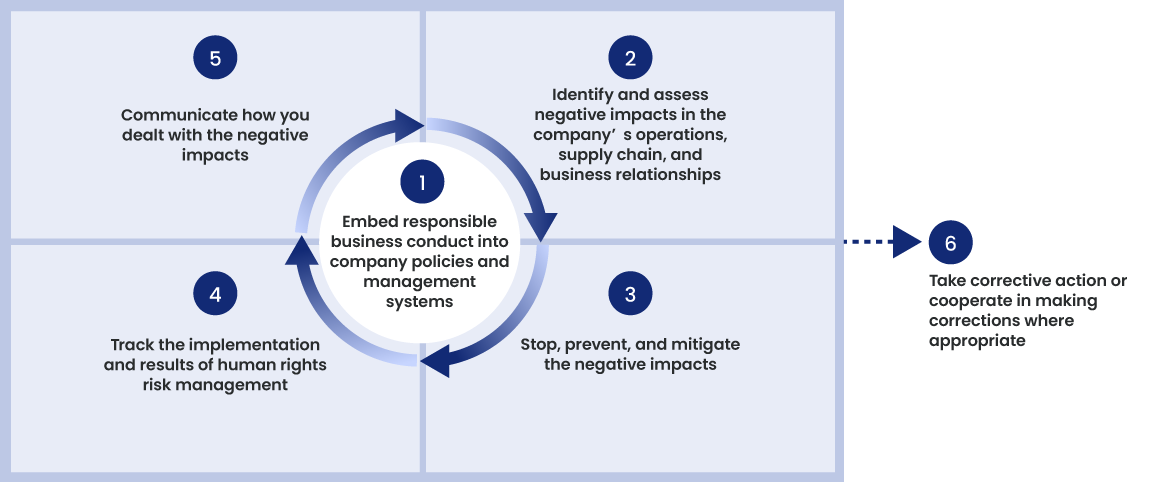
Identifying human rights risks
TIn FY2021, we held study sessions led by experts and identified human rights risks through the methods we had learned for identifying risks and through interviews with people with expatriate experience. As part of the scoping process, the Group Sustainable Procurement Committee conducted a desktop survey of the risks facing first- and second-tier suppliers. Based on the results, we created human rights risk mapping and identified important human rights issues within The CITIZEN Group. The human rights risk mapping is planned to be reviewed regularly.
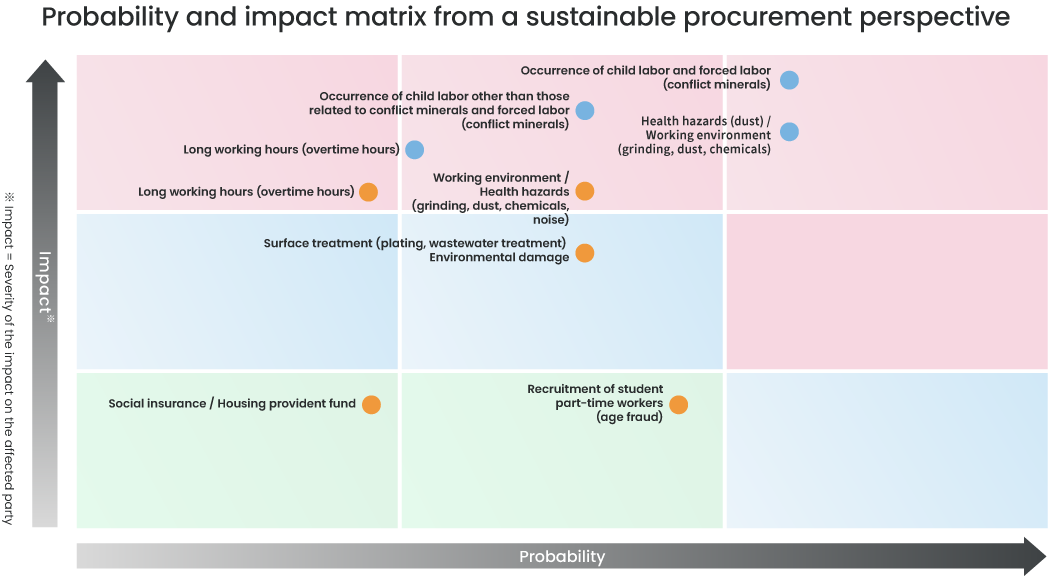
Important human rights issues
The human rights impact assessment revealed that there were risks associated with conflict
minerals and the working environment of raw material suppliers.
Regarding conflict minerals, we are
conducting due diligence at smelters for each of the 3TG minerals. Please check our "Responsible
Minerals Procurement Activities."
With regard to the working environment of raw material suppliers,
in order to confirm human rights risks, we conducted a site visit of five Chinese suppliers in FY2023
and FY2024 using our self-developed "Health, Safety, and Labor Management Checklist," identified any
human rights risks of concern, and took preventive measures for potential risks.
- * CFS-certified smelters: Smelters certified by the Responsible Minerals Initiative (RMI) RMAP
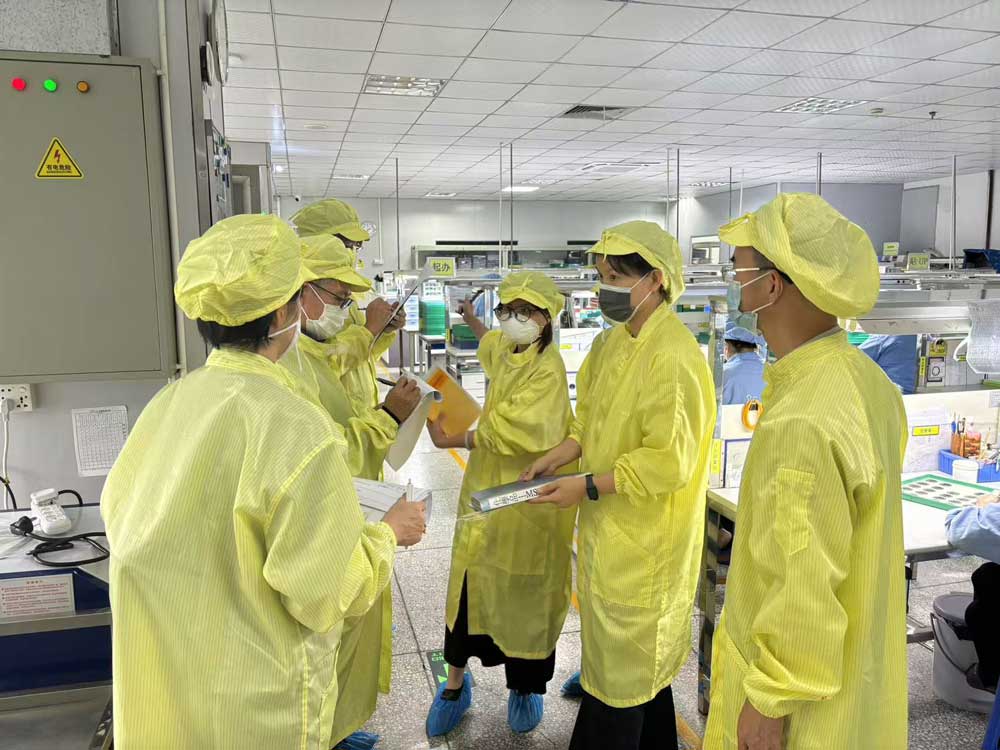
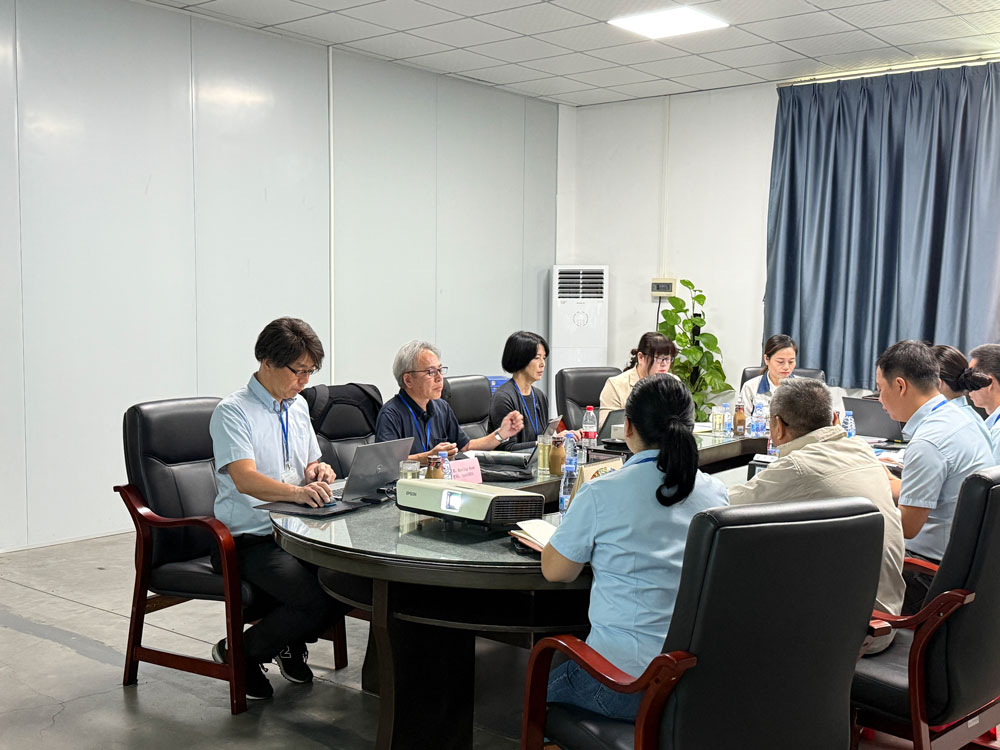
On-site inspection of a Chinese supplier
Policy on the Rights of the Child
Regarding human rights risks in the supply chain, The CITIZEN Group supports the Japan Committee for UNICEF's "Children's Rights and Business Principles" (CRBT) and is committed to avoiding violations of children's rights in its business operations and to working toward the realization of children's rights. In FY2023 and FY2024, we participated in "Eliminating Child, Early, and Forced Marriage in Laos" through support for the activities of Plan International, an international NGO, and we have worked to establish a girl-friendly school environment and to raise awareness among parents about premature marriage.
Responsible Minerals Procurement
The CITIZEN Group also recognizes conflict minerals, which carry the risk of funding armed groups and human rights abuses, as an important procurement risk. Recognizing the application of the EU Conflict Minerals Regulation in 2021, as well as the expansion of target minerals, target regions, and target risks, we revised our existing Conflict Minerals Response Policy into The CITIZEN Group Responsible Minerals Procurement Policy in January of the same year. The revised policy clarifies the expansion of targeted minerals and sourcing regions, as well as the actions to be taken when risks are identified. In addition to suppliers procuring the subject minerals, The CITIZEN Group itself is working to eliminate conflict minerals as a supplier by complying with the code of conduct of the Responsible Business Alliance (RBA) at the request of suppliers to whom it delivers parts and other items.
The CITIZEN Group Responsible Minerals Procurement Policy (Established April 2019. Amended January 2021)
To fulfill our social responsibilities in the supply chain in cooperation with our business partners, The CITIZEN Group, as a policy, will not use target minerals*1 that may contribute to any risk of human rights abuses such as child labor or forced labor, environmental destruction, conflict, terrorist financing, money laundering, corruption, or fraudulent financing in mining, trading, handling, export, and our other business activities.
This does not mean, however, that any and all minerals mined and traded in conflict areas and high-risk areas should not be used, and we may use minerals mined and traded in these areas if they are not related to human rights violations, environmental destruction, conflicts, corruption, or other wrongdoings.
If a potential target risk*2 is confirmed, we will ask the relevant business partners to take corrective actions.
- Target minerals: 3TG (tantalum, tin, tungsten, gold) and cobalt
- Target risks: Risks and environmental destruction under Annex II of the OECD Guidance:
System for Promoting Responsible Minerals Procurement
At the CITIZEN Group Sustainable Procurement Committee, which convenes twice a year, the CITIZEN Group shares its goals and KPIs for responsible minerals procurement. At the end of the fiscal year, the Sustainability Committee reports and reviews the status of initiatives and holds study sessions to implement ongoing efforts and improvements.
The CITIZEN Group Sustainable Procurement Committee takes the lead in implementing Group-wide measures for responsible minerals procurement, and the status of these measures is shared with the Board of Directors through reports to the Sustainability Committee.

Please scroll down to see→
| Goal | Achievement status | Details of results |
|---|---|---|
| Conduct due diligence on responsible minerals procurement in accordance with the Organisation for Economic Co-operation and Development guidelines (Due Diligence Guidance for Responsible Supply Chains of Minerals from Conflict-Affected and High-Risk Areas). | Achieved | We have conducted due diligence on conflict minerals in our supply chain in line with OECD guidance. For details, please refer to "Status of Responsible Minerals Procurement Initiatives" below. |
Responsible Minerals Procurement Initiatives (Disclosure and Remediation)
The CITIZEN Group recognizes that 3TG (tin, tantalum, tungsten, gold), which originates from conflict-affected and high-risk areas (CAHRAs) such as the Democratic Republic of the Congo and neighboring countries, is an important international issue because it is a source of funding for armed groups and incites conflict, human rights abuses, and environmental destruction. We also endorse the concept of the OECD "Due Diligence Guidance for Responsible Supply Chains of Minerals from Conflict-Affected and High-Risk Areas" and are implementing initiatives in line with the framework set forth by the Guidance.
In FY2024, 224 of the 349 specific smelters obtained RMAP certification and were identified as conflict-free. The percentage of those in the process of certification or audit was 65.3%.
Furthermore, The CITIZEN Group is taking proactive measures to enhance the elimination of conflict minerals. This involves divulging the proportion of smelters that hold Conflict-Free Smelter (CFS) certification for each mineral, adhering to the prescribed framework. These efforts are geared towards addressing the situation from the perspective of human rights risks, underlining our commitment to responsible practices, and The CITIZEN Group is strongly promoting the elimination of conflict minerals.
Framework for Initiatives under the OECD Guidance (Steps 1-4)
- Step 1Establish strong company management systems
-
Based on The CITIZEN Group Basic Procurement Policy and The CITIZEN Group Responsible Minerals Procurement Policy, we are promoting Group-wide measures to deal with conflict minerals. Each Group company that may be involved in conflict minerals educates employees in the relevant departments about conflict minerals and requests that suppliers understand The CITIZEN Group Basic Procurement Policy and The CITIZEN Group Responsible Minerals Procurement Policy and comply with The CITIZEN Group Code of Conduct and The CITIZEN Group CSR Procurement Guidelines.
- Step 2Identify and assess risks in the supply chain
-
The 3TG surveys are conducted using the Conflict Minerals Reporting Template (CMRT), a tool provided by the Responsible Minerals Initiative (RMI), to check for the presence of conflict minerals, identify smelters/refiners in the supply chain, and confirm and assess the state of conformity to RMAP* and the state of suppliers’ initiatives to address subject minerals.
In addition, for cobalt, a survey using the Extended Minerals Reporting Template (EMRT) has been conducted since FY2021 according to the business characteristics of The CITIZEN Group.
- Step 3Design and implement a strategy to respond to identified risks
-
Based on the results of the survey, we communicate the identified risks to suppliers who have identified risks, such as transactions with smelters/refineries that do not comply with the RMAP and a lack of transparency of the subject minerals, and provide consultation and support for improvement, including smelter changes.
Requests from The CITIZEN Group customers to provide supply-chain information are responded to by providing information using the above CMRT and EMRT, along with the additional questioning of suppliers, requests for the resubmission of the CMRT or EMRT, and surveying.
- Step 4Carry out independent third-party audits of smelter/refiner due diligence
-
By asking suppliers to procure minerals from smelters/refineries conforming to RMAP or to the compliance standards of The CITIZEN Group customers, we encourage RMAP conformity by smelters/refineries through our suppliers.
- * RMAP (Responsible Minerals Assurance Process) Responsible Minerals Audit Process
Other Responsible Minerals Procurement Initiatives
RJC Certification
CITIZEN WATCH COMPANY OF AMERICA, INC. joined the Responsible Jewellery Council (RJC) in 2019 and achieved certification in 2023.
RJC certification demonstrates our commitment to promoting ethical business practices and sustainable supply chains, and we maintain high standards for improving working conditions, respecting human rights, and protecting the environment. The CITIZEN Group will continue to focus on sustainability and social responsibility as it strives to realize a sustainable future.
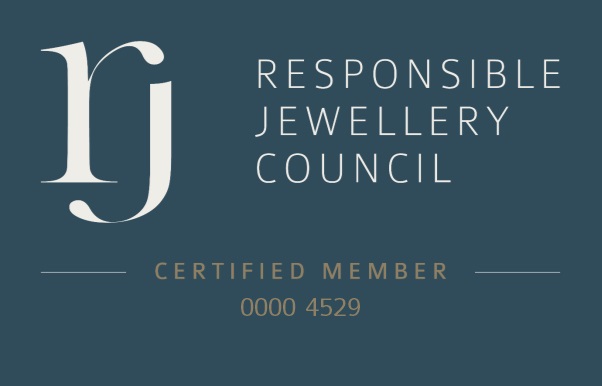
Lab-Grown Diamonds
As with 3TG, The CITIZEN Group is also committed to the responsible procurement of diamonds, which are at risk of being involved in disputes.
CITIZEN WATCH uses "lab-grown diamonds," which are synthetic diamonds of the same quality as natural diamonds, in some of its products. Lab-grown diamonds do not require the mining and processing of rough diamonds and are thus not only ethical, as they are free from the risk of involvement in conflict minerals, but also have only a very minor environmental impact.

Green Procurement
The CITIZEN Group is implementing "Green Procurement," which prioritizes the purchase of products, parts, raw materials, etc. with a low environmental impact from suppliers who are promoting environmental management activities. We ask our suppliers to understand the importance of environmental management activities and cooperate with our activities by submitting the Green Procurement Standards Declaration of Conformity (14th edition) and the scheme for communicating information on chemical substances contained in products (chemSHERPA). (Revised in July 2025)
- Reference Information
-
- The CITIZEN Group Green Procurement Standards (14.2nd Edition)
- Annex (List of Substances to be Controlled) (14_2025 Edition)
Items to Be Submitted by Suppliers
The following items are requested to be submitted in accordance with The CITIZEN Group Green Procurement Standards.
- Items to be submitted in writing
-
The CITIZEN Group Green Procurement Standards Declaration of Conformity (14.2nd Edition)
- Items to be submitted electronically
-
Scheme for the Communication of Information on Chemical Substances in Products (chemSHERPA)*
- * Provision of information on the chemical substance content of procured goods: In order to comply with the EU REACH and other laws and regulations concerning the management of information on chemical substances contained in procurement items, we request that our business partners submit information on the chemical substances contained in procurement items, in principle, using the common format (chemSHERPA-CI/AI) provided by the Joint Article Management Promotion consortium (JAMP).
[Case Study] Green Procurement through Collaboration with Suppliers
CITIZEN WATCH (CHINA) CO., LTD.
The CITIZEN WATCH (CHINA) CO., LTD. Environmental Management Department manages, audits, and supports improvement of compliance with environmental regulations of exterior parts suppliers in South China based on the Citizen Green Procurement Standards.
We have exchanged Declarations of Conformity with our suppliers based on the latest version of the Green Procurement Standards, and we conduct audits of documents, actual products, and sites of important suppliers. We certify suppliers with excellent evaluation results as "Citizen’s Green Partners," and 41 suppliers were certified in 2024. We also held a green procurement briefing session, with 12 suppliers participating in FY2024.
Every year, we collect a list of materials that make up parts and composition information from our suppliers, confirm their compliance with the latest global regulations (RoHS, REACH nickel restriction, conflict minerals, etc.), and provide guidance for improvement. In the development stage/4M change, we are responsible for environmental evaluation of new materials and new suppliers, and in the mass production stage, we conduct sampling inspections of incoming parts for phthalic acid restricted substances.
The understanding and cooperation of our suppliers are essential to our environmental response. We will continue to promote sustainable procurement based on Citizen’s environmental policy while holding dialogue with our suppliers.
